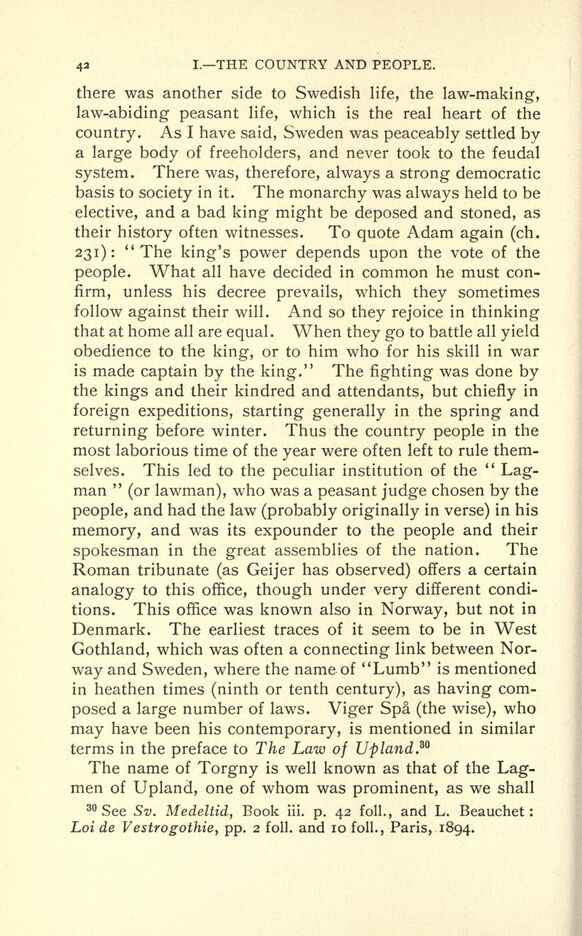
Full resolution (JPEG) - On this page / på denna sida - I. Introductory Lecture.—The Country and its Inhabitants in the Heathen Period up to 1000 A.D. - § 9. General idea of the character and life of the people

<< prev. page << föreg. sida << >> nästa sida >> next page >>
Below is the raw OCR text
from the above scanned image.
Do you see an error? Proofread the page now!
Här nedan syns maskintolkade texten från faksimilbilden ovan.
Ser du något fel? Korrekturläs sidan nu!
This page has never been proofread. / Denna sida har aldrig korrekturlästs.
43 I. THE COUNTRY AND PEOPLE.
there was another side to Swedish life, the law-making,
law-abiding peasant life, which is the real heart of the
country. As I have said, Sweden was peaceably settled by
a large body of freeholders, and never took to the feudal
system. There was, therefore, always a strong democratic
basis to society in it. The monarchy was always held to be
elective, and a bad king might be deposed and stoned, as
their history often witnesses. To quote Adam again (ch.
231): "The king s power depends upon the vote of the
people. What all have decided in common he must con
firm, unless his decree prevails, which they sometimes
follow against their will. And so they rejoice in thinking
that at home all are equal. When they go to battle all yield
obedience to the king, or to him who for his skill in war
is made captain by the king." The fighting was done by
the kings and their kindred and attendants, but chiefly in
foreign expeditions, starting generally in the spring and
returning before winter. Thus the country people in the
most laborious time of the year were often left to rule them
selves. This led to the peculiar institution of the
"
Lag-
man "
(or lawman), who was a peasant judge chosen by the
people, and had the law (probably originally in verse) in his
memory, and was its expounder to the people and their
spokesman in the great assemblies of the nation. The
Roman tribunate (as Geijer has observed) offers a certain
analogy to this office, though under very different condi
tions. This office was known also in Norway, but not in
Denmark. The earliest traces of it seem to be in West
Gothland, which was often a connecting link between Nor
way and Sweden, where the name of "Lumb" is mentioned
in heathen times (ninth or tenth century), as having com
posed a large number of laws. Viger Spa (the wise), who
may have been his contemporary, is mentioned in similar
terms in the preface to The Law of Upland.
ZQ
The name of Torgny is well known as that of the Lag-
men of Upland, one of whom was prominent, as we shall
30
See Sv. Medeltid, Book iii.
p. 42 foil., and L. Beauchet :
Loi de Vestrogothie, pp. 2 foil, and 10 foil., Paris, 1894.
<< prev. page << föreg. sida << >> nästa sida >> next page >>